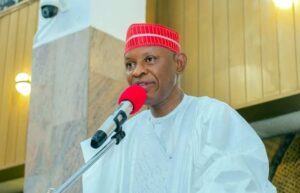In a decisive move aimed at tightening financial management and oversight, the Kano State Government has mandated the closure of all bank accounts operated by its ministries, departments, and agencies (MDAs). This directive, issued by Governor Abba Yusuf during a high-level meeting at the Government House in Kano, signals a significant shift towards a centralized financial system in the state. The governor’s directive calls for all existing accounts under MDAs to be merged into a single treasury account. This move, he explained, is part of a broader strategy to address and rectify financial irregularities that have been observed across various governmental bodies.
Governor Yusuf elaborated on the rationale behind this sweeping reform, noting that the state government had identified numerous instances of financial misconduct and irregularities within its ministries and agencies. “The government has taken this step to ensure that funds are managed properly and to eliminate any avenues for financial misconduct,” he asserted. By consolidating the state’s finances into a unified treasury account, the government aims to streamline the management of public funds, enhance transparency, and reduce the risk of misappropriation.
 The directive is not merely a suggestion but a mandate with serious implications for non-compliance. Governor Yusuf emphasized the urgency of this directive, warning that any ministry or agency that fails to adhere to the new financial structure within the stipulated one-week deadline would face stringent legal consequences. This ultimatum underscores the administration’s commitment to enforcing financial discipline and accountability within the public sector.
The directive is not merely a suggestion but a mandate with serious implications for non-compliance. Governor Yusuf emphasized the urgency of this directive, warning that any ministry or agency that fails to adhere to the new financial structure within the stipulated one-week deadline would face stringent legal consequences. This ultimatum underscores the administration’s commitment to enforcing financial discipline and accountability within the public sector.
In addition to Governor Yusuf’s remarks, the Chairman of the Kano State Internal Revenue Service (KIRS), Zayyid Abubakar, provided further insight into the new fiscal approach. Abubakar introduced a revamped plan for tax collection that aligns with the unified treasury account system. “This system will help increase revenue for Kano State and curb the misappropriation of government funds,” Abubakar stated. The new tax collection strategy is expected to not only bolster the state’s revenue base but also ensure that collected taxes are accounted for and utilized in a transparent manner.
The meeting, which underscored the administration’s resolve to enhance financial governance, was attended by a broad spectrum of high-ranking officials. Among those present were the Chief of Staff to the Governor, Shehu Sagagi, various commissioners, heads of ministries and agencies, and representatives from several banks. This wide-ranging attendance reflects the comprehensive nature of the financial reforms being undertaken and the collaborative approach the state government is adopting to implement these changes.
By bringing all financial activities under one roof, the Kano State Government is taking a firm stand against financial mismanagement. This centralization is anticipated to not only improve the efficiency of financial operations but also build public trust in the government’s handling of state resources. As these reforms are set into motion, they will likely serve as a model for other states grappling with similar challenges of financial mismanagement and corruption. The success of Kano’s unified treasury account system will be closely watched by policymakers and financial experts both within Nigeria and beyond, as a case study in state-level financial reform.
The next few weeks will be crucial as ministries, departments, and agencies adjust to the new directives. The effectiveness of this move will depend heavily on how swiftly and thoroughly these entities can adapt to the changes. The state government’s resolve, as articulated by Governor Yusuf and reinforced by the KIRS chairman, is clear: there will be no tolerance for financial indiscipline, and those found flouting the new rules will be held accountable. This initiative marks a pivotal moment in Kano State’s governance, with the potential to reshape the financial landscape of the region.




